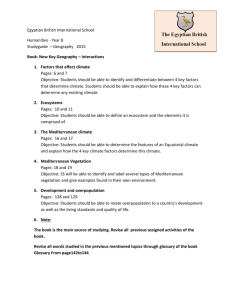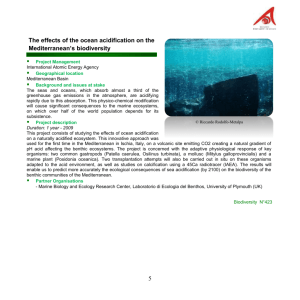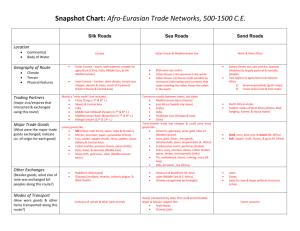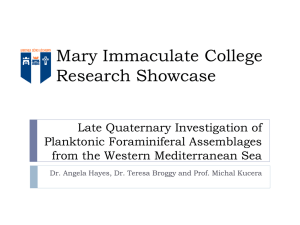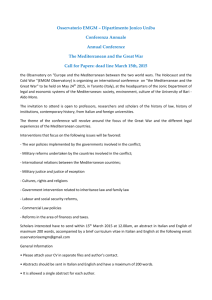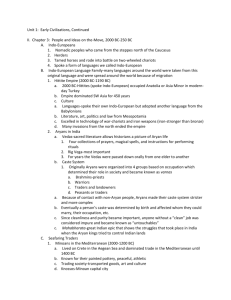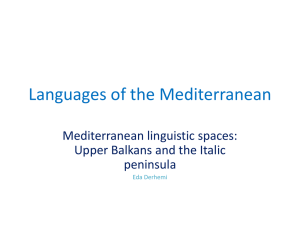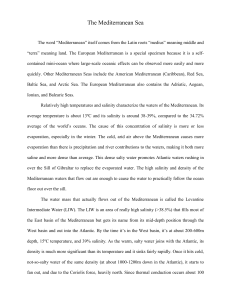Draft Report on a sustainable urban agenda in the
advertisement
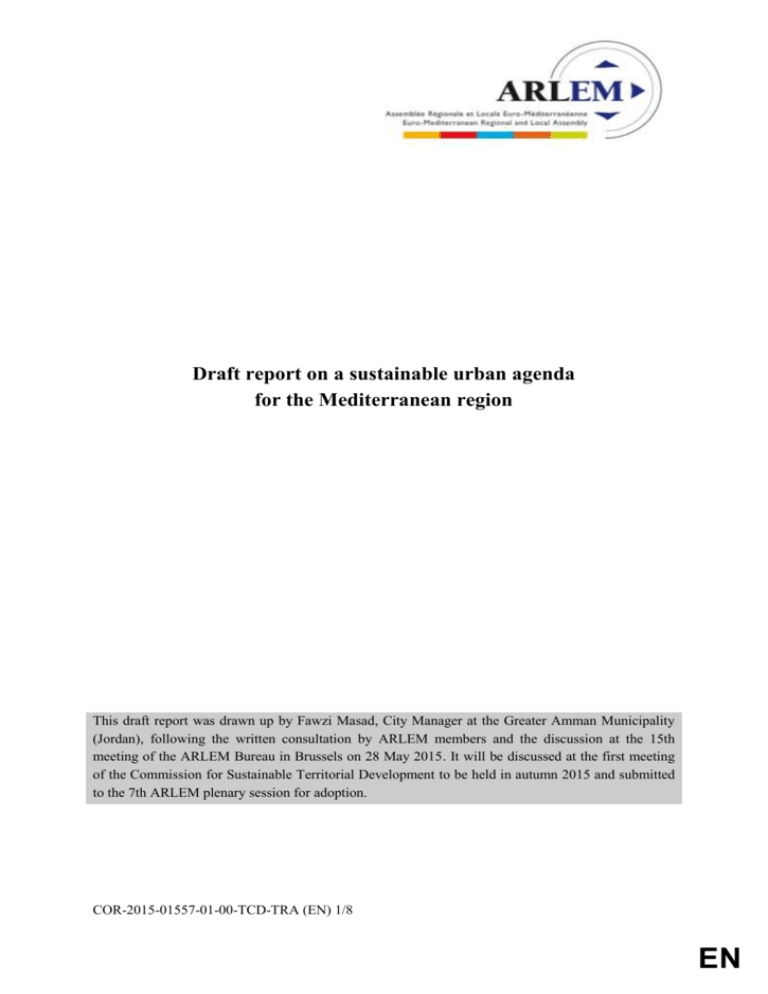
Draft report on a sustainable urban agenda for the Mediterranean region This draft report was drawn up by Fawzi Masad, City Manager at the Greater Amman Municipality (Jordan), following the written consultation by ARLEM members and the discussion at the 15th meeting of the ARLEM Bureau in Brussels on 28 May 2015. It will be discussed at the first meeting of the Commission for Sustainable Territorial Development to be held in autumn 2015 and submitted to the 7th ARLEM plenary session for adoption. COR-2015-01557-01-00-TCD-TRA (EN) 1/8 EN 1. Background Over the past decades, the world has undergone a remarkable urbanisation 1 process which will continue further. Whereas in 1950, less than one third of the world's population lived in urban areas, today the share of the urban population is just over 50% and by 2050 it is projected that two in three citizens worldwide will live in urban settlements 2 . Between 1970 and 2010, the urbanisation rate around the Mediterranean increased from 54% to 66%, with the south and east Mediterranean urbanising more rapidly than the rest of the world 3 . It is estimated that, by 2025, 72% of the Mediterranean population will live in urban areas. Up to date strategies and their implementation in the Mediterranean region are at pains to keep up with realities driven by significant population growth4 resulting in uncontrolled urban sprawl, partly taking the form of informal settlements with the linked problems of degradation, lack of service provision, and progress hampered by lack of property titles. In the light of this development, the Euro-Mediterranean Regional and Local Assembly (ARLEM) focused, in its first year of work, on sustainable urban development. In its report on urban development in the Mediterranean 5 , adopted in January 2011, ARLEM members recommended adopting a multi-actor approach involving all relevant actors in urban planning. Only an inclusive approach that takes into account all the different aspects of urban development could secure a sustainable dynamic. ARLEM also underlined the importance of good governance and decentralisation as well as the need to focus on the planning and development of medium-sized cities, especially those in inland areas of the Mediterranean countries, so as to control the coastward sprawl. This report fed into the First Ministerial Conference of the Union for the Mediterranean (UfM) on sustainable urban development, held in Strasbourg (France) in November 2011. At this milestone meeting, ministers explicitly recognised the key role of local and regional authorities in the preparation, adoption and implementation of a comprehensive and integrated sustainable urban and spatial development agenda. They provided the UfM with a clear mandate and action plan for a EuroMediterranean Sustainable Urban Development Strategy, comprised of the following elements: 1 2 3 4 5 A guidance framework for sustainable Euro-Mediterranean cities and territories; Sustainable urban development projects, to be supported by donors; In line with the definition used at the level of the Union for the Mediterranean, ARLEM regards as urban areas compact concentrations of more than 15 000-20 000 inhabitants (UfM Guidance Framework for Sustainable Euro-Mediterranean Cities and Territories., May 2013, p. 3). United Nations Department of Economic and Social Affairs, Population Division: "Population facts" No. 2014/3, August 2014. GRID-Arendal: Urban population in the Mediterranean countries, from collection "State of the Mediterranean Marine and Coastal Environment", http://www.grida.no/graphicslib/detail/urban-population-in-the-mediterranean-countries_808b (10/3/2015). While the growth rate has significantly decreased after 2011/2012, urbanisation will continue due to both persisting migration flows from rural areas to urban settlements and endogenous urban growth (UfM GF, pp. 5-6). CdR 62/2011; rapporteur: Khalid Al-Hnaifat, mayor of Greater Tafilah (Jordan). COR-2015-01557-01-00-TCD-TRA (EN) 2/8 A study about an Urban Agency for the Mediterranean; An award for urban innovations. Following up this conference, work by the UfM secretariat was completed in May 2013 on both the guidance framework document and a study on the creation of an urban agency for the Mediterranean as well as on an award for urban innovations, developed by the European Institute of the Mediterranean (IEMed). The Urban Planning Financing Initiative (UPFI) was established to develop "sustainable and innovative urban projects which serve as best practice example and are potentially re-usable"6, supported by international financial institutions and donors (AfD and EIB together with the EC, in association with other IFIs). 2. Context 2015 is witnessing important political developments concerning a sustainable urban agenda for the Mediterranean region at the levels of the Union for the Mediterranean, the European Union as well as the United Nations (UN). UPFI is one of the priorities of the UfM work programme for 20157, with three projects (Imbaba, Sfax-Taparura and Bouregreg) already labelled by senior officials and more to follow suit at the next meetings. In total, up to 27 projects were identified in nine Mediterranean partner countries, accounting for an investment of EUR 5 billion. After the first phase which focused on project selection and the specification of Technical Assistance, the implementation of this assistance was launched in June 2015, marking the start of the second phase8. The possibility of convening a followup ministerial meeting on urban development is currently being gauged. At the level of the European Union, which is increasingly integrating urban issues into its external policies, there is considerable momentum – despite different views held at top levels of the new European Commission (EC) – for an urban agenda, which would see urban areas more closely associated with EU policy-making 9 . Following a consultation in 2014, a related EC report was published in May 201510. The Dutch Council Presidency in the first half of 2016 is interested in the urban agenda. An urban agenda could become the EU's contribution to the international debate. At the 6 7 8 9 10 UfM secretariat: Note on the Urban Projects Finance Initiative, January 2015. Annual Work Programme 2015, presented by the UfM secretariat. http://ufmsecretariat.org/union-for-the-mediterranean-promotes-e5-billion-urban-investment-in-27-projects/ (11 August 2015). European Committee of the Regions: Opinion "Towards an Integrated Urban Agenda for the EU" (COR-2013-06902-00-00-AC), adopted on 25-26 June 2014; European Parliament: Draft report on the urban dimension of EU policies, 2014/2213(INI). Commission Staff Working Document "Results of the public consultation on the key features of an EU Urban Agenda" (SWD(2015) 109 final/2) of 28 May 2015. COR-2015-01557-01-00-TCD-TRA (EN) 3/8 same time, the current programmes of the European Neighbourhood Policy (ENP) also support urban development11. At the global level, since the adoption of the Millennium Development Goals, the urban dimension is increasingly reflected in the development framework, and in this context 2015 is a decisive year to set the frame for the 15 years to come. One of the Sustainable Development Goals proposed for adoption by the 2015 UN general assembly is to "make cities and human settlements inclusive, safe, resilient and sustainable"12. In parallel, a new urban agenda is being prepared in the run-up to the United Nations Conference on Housing and Sustainable Urban Development (Habitat III) to be held in 2016. The political agenda on all levels is confronted with terrorism in the Mediterranean region, spurred by radicalism, which had devastating effects on many Mediterranean cities. Current developments and crises completely take the challenges of a sustainable urban development out of any steady state scenario, gravely impacting on security, infrastructure, and provision of services. Finally, one crucial context aspect is the political turbulence. The humanitarian conditions in Syria, Libya and Palestine are gravely impacting on cities in the region in social, environmental and economic ways and posing huge challenges to any sustainable planning. These developments frame the political context of ARLEM's work on a sustainable urban agenda for the Mediterranean region. Four years after the first ARLEM report on urban development and the Strasbourg Ministerial Meeting, the time has come to take stock of existing strategies and their implementation and send a message to the different governance forums concerned. ARLEM members are the legitimate representatives of municipalities and regions on the three shores of the Mediterranean and are thus best placed to voice the vision of local and regional authorities for a sustainable urban agenda for the Mediterranean region and their need to play an active transformative role in the process. 3. Issues at stake The way in which today's urbanisation is managed and its opportunities seized will shape the face of the Mediterranean region tomorrow. Numerous and interlinked issues are at stake concerning the economic, environmental and social dimensions of sustainability. 11 12 13 Cities are the engines of economic growth13 and hubs of education and innovation. This is what increasingly attracts both poor and well-off parts of the population and drives rural-urban The ENP is currently being revised. Following a European Commission consultation (see Joint Consultation Paper "Towards a new European Neighbourhood Policy", JOIN(2015)6 final of 4.3.2015) to which ARLEM contributed a position paper (http://cor.europa.eu/en/activities/arlem/Documents/arlem-position-enp-en.pdf), the publication of a European Commission communication is expected in autumn 2015. Draft outcome document "Transforming Our World: The 2030 Agenda For Sustainable Development", https://sustainabledevelopment.un.org/content/documents/7891TRANSFORMING%20OUR%20WORLD.pdf (12 August 2015). "The global observation shows a direct relationship between urbanisation levels and GDP." UfM GF, p. 13. COR-2015-01557-01-00-TCD-TRA (EN) 4/8 14 15 16 17 18 19 20 migration. Education and innovation are key factors to counter unemployment. For many cities in the Mediterranean region, they can help to diversify the economy and thus reduce economic dependence on conventional tourism. Developing ecotourism is also a very promising element in this regard to reduce the environmental impact of tourism while strengthening the economy14. "A key challenge for policy makers is to ensure that access to jobs and service is possible for residents from all types of backgrounds and that adequate opportunities for education and skill acquisition are within reach for everyone to foster integration and to avoid segregation"15. One means towards this end is a well-functioning public transport16 system. This leads us to the key issue of the provision of public services, ranging from basic infrastructure services such as water and sanitation, waste collection and management 17, transport and energy, over social services such as education, health, housing, and elderly and child care, to services further enhancing the quality of life such as public safety, urban planning, culture and entertainment, sport, and public spaces18. According to the European Investment Bank, roughly EUR 60 billion will need to be invested over the next 20 years into urban infrastructure in the Mediterranean basin19. Basic local services play a vital role for the realisation of human rights and dignity and lay the base for economic development and social equity. Mediterranean cities often face big difficulties in delivering these basic services to an ever growing number of inhabitants, especially taking into consideration the recent political turbulence in the region. The extreme income inequality threatens social cohesion and future sustainability. Territories become very vulnerable if there are no policies in place to immunise them from the potentially eruptive results. Vulnerable groups must not be left behind in the rapid urbanisation processes. From an environmental angle, despite the enormous pollution and congestion levels experienced in many places by the Mediterranean urban population, there lies enormous potential in urbanisation as "cities can sustain very high living standards with small ecological footprints"20. The key question here is if cities on the Southern and Eastern shores of the Mediterranean, which are still very dynamic compared to European cities where the speed of urbanisation has slowed down, can forgo failed models their European counterparts followed in their development, such as "the spreading of urban areas over the countryside, the strict partition of the city in specialised zones or the creation of new residential and activity areas with excessive reliance on the private See the ARLEM report on sustainable tourism in the Mediterranean (rapporteur: Michèle Sabban, Assembly of European Regions), adopted in February 2013 (CDR10120-2012_00_02_TRA_TCD), http://cor.europa.eu/en/activities/arlem/Pages/sudev.aspx. OECD Policy Highlights: The Metropolitan Century. Understanding urbanisation and its consequences, p. 5. See the ARLEM report on sustainable urban mobility (rapporteur: Karim Bennour, President of the People's Assembly of the Wilaya of Algiers, Algeria), adopted in February 2014 (COR-2013-02354-00-02-TCD-TRA). See the ARLEM report on waste management at local and regional level in the Mediterranean region (rapporteur: Mohamed Boudra, President of Taza-Al Hoceima-Taounate region, Morocco), adopted in December 2014 (COR-2014-01462-00-02-TCDTRA). United Cities and Local Governments (2013): Third Global Report on Local Democracy and Decentralisation – Basic Services for All in an Urbanizing World (GOLD III). http://ufmsecretariat.org/union-for-the-mediterranean-promotes-e5-billion-urban-investment-in-27-projects/ (11 August 2015). David Satterthwaite, Senior Fellow at the International Institute for Environment and Development, speaking at the second global meeting of the Policy Forum on Development, hosted by the European Committee of the Regions, October 2014. COR-2015-01557-01-00-TCD-TRA (EN) 5/8 car [… which have led to] congestion, environmental degradation, waste of land and energy"21. What is needed here is no less than a complete transformation of existing patterns. A compact and mixed-use smart Mediterranean city model might lead the way22. The historical vulnerability of Mediterranean cities to hazards like meteorological events such as earthquakes and floods is further increased as a result of climate change 23 . One of the main challenges for Mediterranean cities today lies in building up resilience and finding ways to mitigate and adapt to climate change. In general, the different aspects of urban planning such as transport, energy and water, social coherence and economic development, must be considered together in an integrated manner. This is one of the lessons of past experiences. All stakeholders, including the private sector but also vulnerable populations at risk of social exclusion, must be brought together with more traditional actors in urban and spatial planning to achieve more sustainable results. Finally, several of the issues mentioned, starting out in an already vulnerable situation e.g. as concerns the availability of water, become even more acute due to the current influx of refugees which is not likely to cease in the short term. Providing adequate support for host communities is a major challenge to the municipalities concerned, whose services, resources, and infrastructure have been extremely strained. This can be observed in solid waste management, water, sanitation and infrastructure, energy supply and the cost of it, employment and housing, provision of schools and healthcare centres and in general urban planning. Local and regional authorities are the pulse of these multiple challenges. They have to be empowered to play a positive and transformative role in this set-up. At the Strasbourg Ministerial Meeting in 2011, ministers pledged "to rely more on the local and regional authorities for the preparation, adoption and implementation of a comprehensive and integrated sustainable urban and spatial development strategy". Four years later, it is time for local and regional authorities to finally take their place in the driving seat for a sustainable urban agenda for the Mediterranean region. 4. Promoting a sustainable urban agenda for the Mediterranean region For cities to thrive, they need to have an adequate legal framework in place. A city where rules are not only clear and intelligent, but also consistently enforced, a city where rights are guaranteed will be appealing both to investors and citizens, which will in turn create productivity24. In urban planning and development, public space must be considered as an essential resource for citizens, be it for educational, social or recreational purposes. The fact that in slums, only 2-5 % of 21 22 23 24 UfM GF, p. 15. CAT-Med project. UNEP/ PAM/ Plan Bleu: A diagnosis of the Mediterranean cities situation, January 2012, p. 9. For some places in the Mediterranean region, overcoming terrorism and restoring governance is a necessary precondition for the success of sustainable urban planning. COR-2015-01557-01-00-TCD-TRA (EN) 6/8 space is public is very telling. Well-kept and inviting public space can create a sense of ownership and belonging among citizens. Of course, matters of urban design are easier to address in the evolving phase than later when there might be social and political questions linked to a restructuring. More specifically, in the current pattern of rapid urbanisation in many southern and eastern Mediterranean countries, now is the right time to put in place design instead of uncontrolled growth. As the particular situation of urbanisation differs between the EU side of the Mediterranean sea, where suburbanisation and real estate speculation are big issues, and the Southern side, where the absence of restructuring of agricultural policy results in strong migration movements towards the cities, these contrasting situations need to be treated at the same time but not necessarily in the same way. In the Mediterranean region, existing urban strategies and initiatives mostly lack specific and effective means of implementation. Without a clear implementation methodology and timeline, projects are not sustainable. At the same time, an integrated and strategic way of planning is the only way to succeed; all factors and stakeholders must be taken on board. All levels must work together to achieve a sustainable urban agenda for the Mediterranean region. ARLEM can support the political focus, on several levels, on the issue of sustainable urban development as a precondition for a more sustainable future. At a global level, the proposed Sustainable Development Goal 11 to "make cities and human settlements inclusive, safe, resilient and sustainable" must be maintained. In particular in the Mediterranean region, its thorough implementation is essential. At EU level, ARLEM calls on upcoming EU presidencies to think of and act on the urban issue not only within the EU, but also in its external relations with neighbouring countries. With regard to the European Neighbourhood Policy and in particular the upcoming mid-term review of its programmes, specific attention should be cast on a sustainable urban agenda. Notably innovative projects including sustainable urban development strategies should be encouraged in this respect. A clearer and more coherent EU agenda for refugees that encompasses specific support to hosting cities, regions and communities would greatly contribute to alleviating the burden felt by refugee hotspots. ARLEM members urge the world community and in particular the EU to support these hotspots by all means in order to prevent a total breakdown. The specific issues of cities are not the same throughout the Euro-Mediterranean region. Cities must devise strategies for sustainable development that are in tune with history, local circumstances, culture, and practices. At the same time, Euro-Mediterranean cooperation should establish common guidelines in the form of a Mediterranean charter on sustainable urban development. Such a framework can help Euro-Mediterranean countries to orient themselves integrating social, economic and environmental development. Cooperation and exchange can help to bring about solutions. In this regard, ARLEM can act as a prime forum to exchange practices and guide the way; very promising examples e.g. of cities switching to renewable energy and more energy-efficient solutions for the urban needs can be found on all three shores of the Mediterranean. At this moment, hundreds of innovative projects unfold, e.g. using mobile phones for transport means. Through exchange and learning from peers, this pool of innovation needs to be harnessed for a sustainable urban development. COR-2015-01557-01-00-TCD-TRA (EN) 7/8 On the national level, the focus should be shifted away from building new urban development spaces to prioritise city regeneration. Awareness for risk zones should be increased by a mapping that highlights them, taking into consideration the effects of climate change. On the level of local and regional authorities, these must be enabled, both in terms of competences and of resources, to fully and actively grasp the huge development potential that lies in urbanisation. For instance, the subnational entities should be fully taken on board in devising national development plans. The available means must be channelled to tip the balance for a better and more sustainable development in the future, which is a difficult but very rewarding task in view of the amount and extent of challenges, but also opportunities cities and regions are faced with. _____________ COR-2015-01557-01-00-TCD-TRA (EN) 8/8
